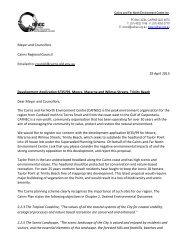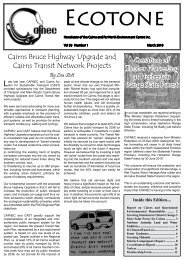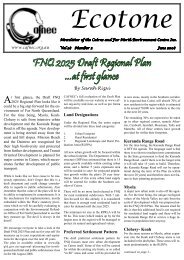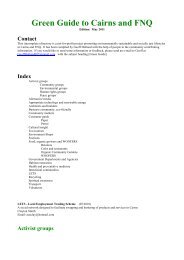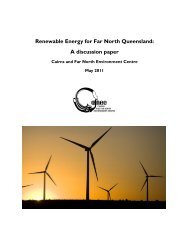Ecotone Vol32 No4 - CAFNEC
Ecotone Vol32 No4 - CAFNEC
Ecotone Vol32 No4 - CAFNEC
You also want an ePaper? Increase the reach of your titles
YUMPU automatically turns print PDFs into web optimized ePapers that Google loves.
BARRON RIVER WATER<br />
QUALITY COMMUNITY<br />
CONFIDENCE PROJECT<br />
BY FOE KURANDA, SYD WALKER<br />
Friends of the Earth in Melbourne have just released<br />
a study into the drinking water supplied to greater<br />
Melbourne [1 ] . The results are disturbing to say the least.<br />
The study may well have relevance to our own situation<br />
as several key factors are similar: a wide diversity of<br />
pesticides used in an agricultural catchment; patchy<br />
data; reluctance to test for the comprehensive range<br />
of potential pollutants; official evasiveness over the<br />
adequacy of testing; and, lack of elaborate filtering<br />
that might remove pesticides from drinking water.<br />
The author, Anthony Amis also raises another issue:<br />
the potential for chemical reactions between chlorine<br />
added to the water supply, as done in Kuranda, and<br />
some of the pesticides, fungicides and herbicides<br />
that find their way into that water. There’s evidence<br />
some of these ‘Disinfection By-Products’ (DCBs)<br />
may be more toxic than the original pesticides [2] .<br />
The International Agency for Research on Cancer<br />
has classified Bromodichloromethane [BDCM] in<br />
Group 2B (possibly carcinogenic to humans). What<br />
this could indicate is that many other communities<br />
across Australia may have none or low numbers of<br />
breaches for Trihalomethanes’s (THMs), yet could<br />
be consuming potentially dangerous levels of<br />
individual Disinfection By-Product’s (DBPs) and these<br />
results are not made public by water authorities.<br />
Some DBP’s have been linked to bladder cancer<br />
and adverse reproductive outcomes. Water<br />
authorities test for a handful of DBP’s, yet 700 have<br />
been discovered. DBP’s are created when chlorine<br />
used as a disinfectant, combines with organic<br />
molecules in the water distribution process.<br />
Friends of the Earth Kuranda have now applied for<br />
a $13,500 State Government grant titled Barron<br />
River Water Quality Community Confidence<br />
Project as part of the LNP Governments<br />
Everyone’s Environment Grant program.<br />
This will allow us to commission the expensive and<br />
sophisticated testing needed to help inform this<br />
debate. We aim to determine if the drinking water<br />
supply for Kuranda and Mareeba meets national<br />
water quality guidelines in relation to the wide range<br />
of chemicals used historically and now in the Barron<br />
catchment. The study will take over 12 months.<br />
We need real information out in the public domain<br />
where it can be scrutinised by the community as<br />
a whole, so we can have informed debate and<br />
outcomes that are seen to be satisfactory.<br />
We are grateful our application has already<br />
received wide endorsement, from diverse quarters<br />
including Djabugay Tribal Council, Kuranda<br />
Envirocare, the Community Action Network and<br />
the Member for Barron River, Michael Trout.<br />
We have been looking for evidence of credible,<br />
regular, specific testing for traces of the hundreds<br />
of complex chemicals that drain every year into<br />
the Barron from agriculture and mining on the<br />
Tableland and for Disinfection By-Products.<br />
In the absence of this, can we be confident the water<br />
is safe If not, is it wise to use this water for drinking<br />
(as well as for irrigation, bathing and fishing)<br />
The safety of our drinking water is an urgent<br />
public health issue and deserves the support and<br />
cooperation of the Tableland Council and the<br />
involvement of the Federal and State politicians<br />
representing the people of Mareeba and Kuranda.<br />
REFERENCES<br />
[1]<br />
Report by Anthony Amis ‘Issues Regarding<br />
Melbourne Drinking Water & Pesticides’, Friends of the<br />
Earth Australian web site, www.melbourne.foe.org.au<br />
[2]<br />
An extract from Report by Anthony Amis SA Water<br />
Drinking Water Quality, January 2000 July 2012, full<br />
report can be found at www.melbourne.foe.org.au<br />
14



